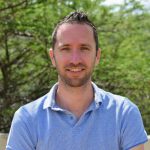In March and April 2021 FutureWater, together with HiView, is conducting a series of online training courses on flying sensors (drones), agricultural applications, hands-on processing and interpretation of aerial imagery, setting up a drone unit, the use of WaPOR to access remotely sensed derived data, and real water savings in Kenya. In a comprehensive course, HiView and FutureWater are reaching out to more than 260 participants with our newly developed eTraining program. The lectures are hosted by Egerton University in Njoro, Kenya. The eTraining project for Egerton University is a Tailor-Made Training (TMT), as part of the Orange Knowledge Programme, funded by Nuffic.
A team of four lecturers delivers nine training sessions, in a period of just over 5 weeks. The lecturers are Martijn de Klerk, Jonna van Opstal and Alexander Kaune from FutureWater, and Jan van Til from HiView. Due to the COVID-19 pandemic, the course is done completely online through FutureWater’s Moodle platform, dedicated to educational use. It offers, next to the virtual classroom, various features like document sharing, assignment submissions, helpdesk forum, record function, and more.
With two more online sessions remaining, so far, the participants received this new form of knowledge sharing enthusiastically. The chat function turns out to be crucial for communication. During the lectures, a participant at any moment can put forward a question or a comment and the speaker is able to react to that in the session.

Stage 2: Targeted in-country training
After the online training sessions a second in-country training will take place with a smaller group, focusing on the use of drones in agriculture. Here a selected group of 12 to 18 members will be trained. Focus will be on staff with lecturing responsibilities, to ensure impact on higher education provision and transfer of the new skills to students.
The in-depth training will consist of:
- Operating flying sensors manually and automatic, the processing of the collected data using open source software, interpretation and the subsequent decision making (recommendations to increase productivity) for (smallholder) farmers and actors
- Use satellite derived (precipitation) products to run crop growth models to provide advice on when and how much to irrigate in agricultural fields
Participants will work on hands-on exercises related to crop performance analyses, water demands and crop growth modelling. Application of the new skills will be further stimulated by assigning the participants clear, tailor-made goals at the end of the second training session, to be worked on during the distant-support period.
Stage 3 and 4: Symposium/knowledge sharing and post-training support
Right after the second training session, a symposium will be organized for a larger audience including the superiors/managers (who most of the times are the final decision makers) of the training participants and representatives of similar organizations. During this knowledge sharing event, trainees and trainers will actively provide contributions to showcase the newly gained skills and their added value to the respective institutions and the Kenyan agricultural sector in general. By acquainting the responsible decision makers in these organizations with the potential applications of flying sensor and satellite-derived data relevant to them, this event will be crucial in ensuring a sustainable impact of the TMT.
Subsequently, progress will be actively monitored and the trainers will provide post-training support to the participants. The support will be both remotely (e.g. through Skype) by the Dutch training providers but also in-person by ThirdEye Kenya staff visiting the participants for Q&A sessions and to evaluate the implementation of the skills they obtained.
Aim of the training
The training will enhance capacity of Egerton educational staff in accessing and using innovative data and tools in the public domain, to analyse crop performance and irrigation management. During the training, university participants will be specifically supported in developing course modules based on the skills gained. To maximize the impact in addressing the need for increased quality of higher education in the agricultural sector, representatives from other institutes, ministries and private sector companies will also be invited. The training will allow the staff to gain advanced skills in working with flying sensors (drones) and satellite-derived data to support agricultural and water-related challenges, such as pests and diseases, water efficiency in agriculture to enhance food security, and drought monitoring. They will acquire insight in and knowledge on analyzing the performance of crops, making the right intervention decisions and giving irrigation advice. For public sector representatives, the training objective is to obtain skills that can be directly and sustainably implemented in their respective organizations.
Overall, the Kenyan society at large will benefit from improved food security provided by well-educated agricultural researchers and professionals. This project forms an important step in the capacity building strategy as it focuses on strengthening the universities and preparing them to provide high quality education to the future generation agronomists and agricultural managers, as well as upgrading the knowledge of current professionals.


